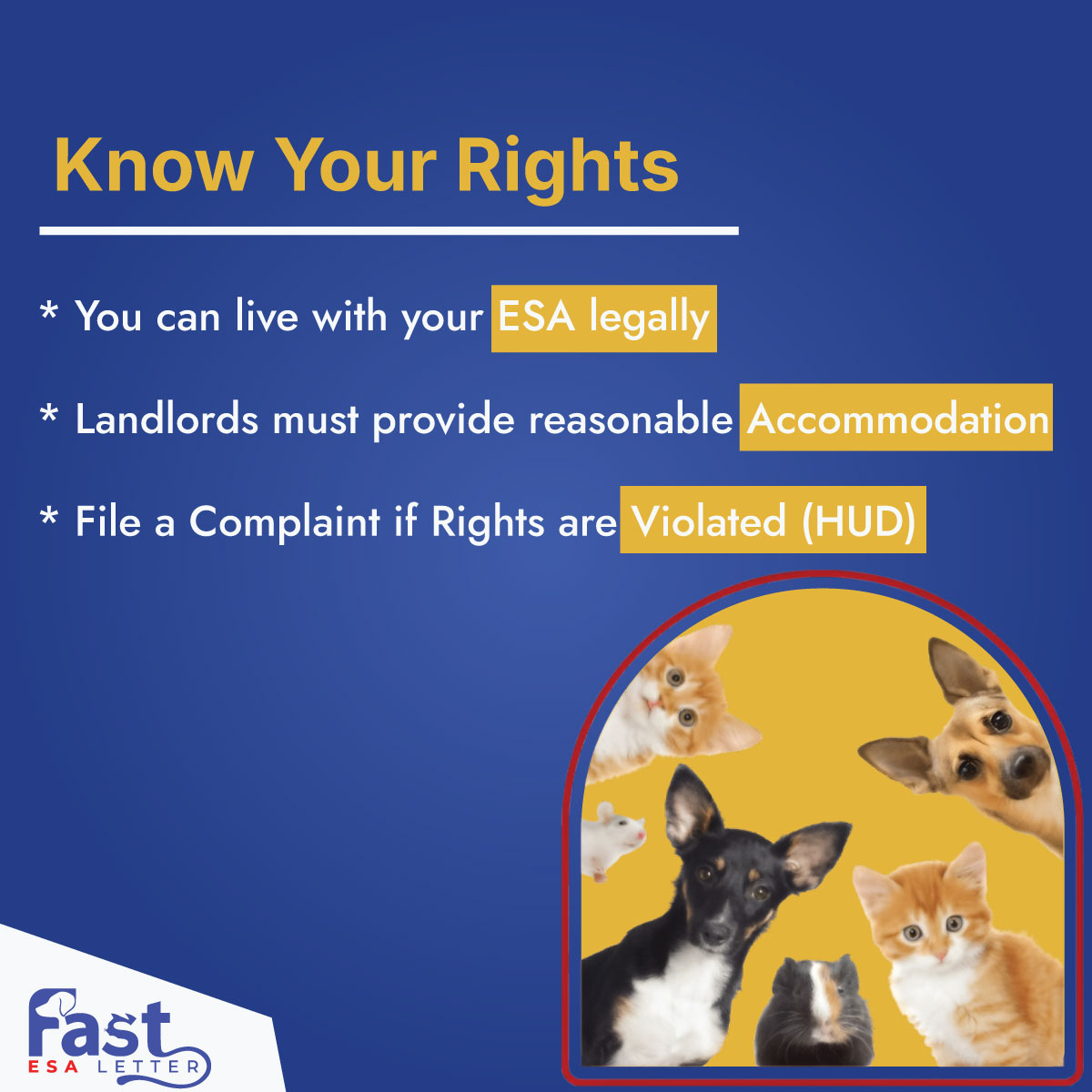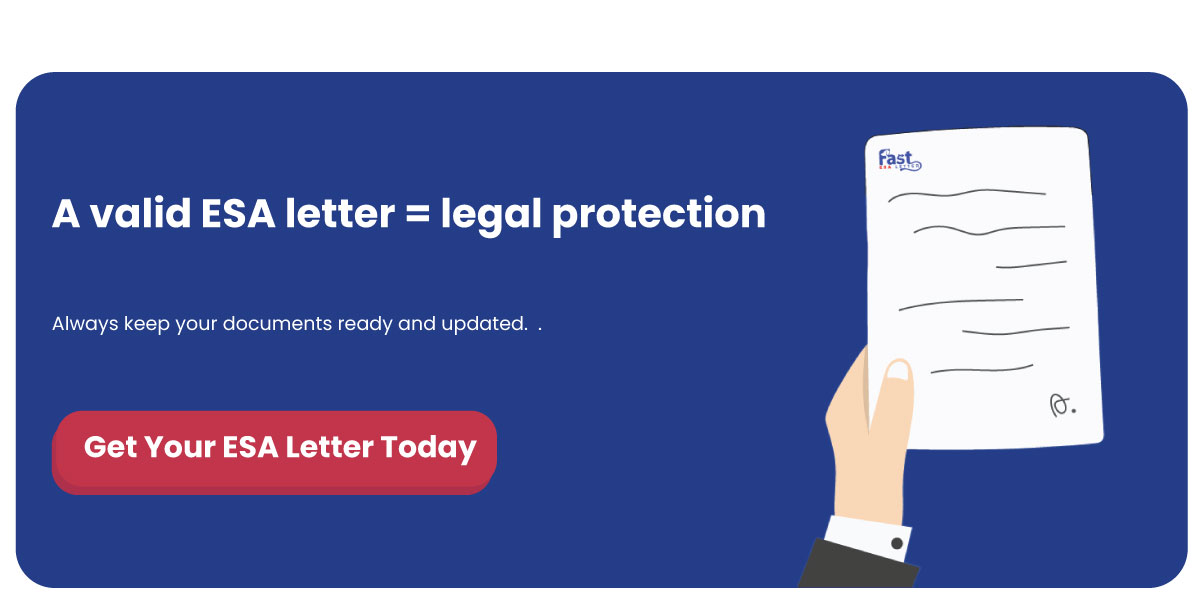What Are the Emotional Support Animal Laws in Utah?

Living with emotional or mental health conditions can be overwhelming, but having an emotional support animal (ESA) by your side can provide comfort, stability, and healing. In Utah, ESA rules differ significantly from standard pet laws or service dog regulations. Understanding these laws ensures compliance and maximizes the benefits of owning an ESA.
If you’re a Utah resident wondering about your emotional support animal rights, this is your go-to guide. From ESA housing laws to pet-friendly spots and ESA travel rules, we will break down everything you need to know.

Emotional Support Animal Housing Rights in Utah
Under the Fair Housing Act (FHA), emotional support animals are recognized as essential companions for individuals managing emotional or mental health conditions, rather than being classified as regular pets.
In Utah, housing providers are legally required to make reasonable accommodations for tenants who have a valid ESA letter. Even in buildings with no-pet policies, landlords must comply with the Fair Housing Act regulations.

Key points under Utah emotional support animal housing laws include:
- No pet deposits or fees can be charged for a verified ESA.
- A legitimate ESA letter from a licensed mental health professional is required.
- The ESA must be well-behaved and not pose a direct threat to others or property.
These protections apply to most types of housing, including apartments, condominiums, and private housing. Whether the ESA is a dog, cat, or another domesticated companion, Utah’s emotional support animal rules ensure your right to live with your animal in a supportive environment.
When Can a Utah Landlord Legally Deny an ESA?
While Utah ESA housing laws protect your right to live with an emotional support animal, there are specific conditions under which a landlord may legally deny your ESA request.

- No Valid ESA Letter: You fail to provide a current ESA letter issued by a licensed mental health professional.
- Undue Financial or Administrative Burden: Approving the ESA would place an unreasonable financial or logistical strain on the housing provider.
- ESA Poses a Direct Threat: Your emotional support animal displays aggressive behavior or poses a threat to the safety or property of others.
- ESA Causes Substantial Property Damage: Past incidents of damage caused by your ESA may justify denial.
- Building Exemptions Apply: The housing unit is part of an owner-occupied building with four or fewer units, or the landlord owns three or fewer single-family homes.
While these exceptions exist, they are applied narrowly to prevent misuse. Tenants who comply with the Fair Housing Act rules and provide proper documentation are generally protected from discrimination.
Emotional Support Animal Laws in Public Places
Unlike service animals, emotional support animals do not have public access rights under the Americans with Disabilities Act (ADA). That means businesses, restaurants, and public facilities in Utah are not required to allow ESAs.
ESA-Friendly Places in Utah
- Tanner Park – Salt Lake City
- Bonneville Shoreline Trail – Provo
- The Rose Establishment – Salt Lake City
- Kimpton Hotel Monaco – Salt Lake City
- Proper Burger Co. – Salt Lake City
- Liberty Park – Salt Lake City

Workplace Policies for Emotional Support Animals in Utah
Currently, there are no federal regulations that require employers to permit emotional support animals in the workplace. Unlike service animals protected under the ADA, ESAs do not have a legal right to accompany their owners to work.
However, some employers may choose to allow emotional support animals as part of voluntary workplace accommodations, especially when mental health support is prioritized.
Employers may consider approving an ESA at work if:
- A valid ESA letter from a licensed mental health professional is provided.
- The ESA is well-behaved and does not disrupt the work environment.
- The presence of the ESA does not create a health or safety concern for other employees.
Helpful Tip:
Frame your request as part of a larger conversation about emotional well-being. Discuss flexible options such as remote work or adjusted schedules if bringing your ESA on-site isn’t feasible.
Can You Travel with an ESA in Utah?
Air Travel with an ESA in Utah
Due to changes in federal law, most U.S. airlines no longer accept ESAs as service animals. They are treated as regular pets and must travel in carriers under the seat.
- You must pay standard pet fees.
- Only psychiatric service dogs (PSD) with specific training are allowed to fly for free.
Rail Travel with an ESA in Utah
- ESAs must be under 20 pounds.
- A fee may apply depending on route and carrier.
Bus Travel with ESA in Utah
- Only trained service dogs are permitted.
- ESAs are generally not allowed on public or interstate buses unless permitted by company policy.
How to Get an ESA Letter in Utah
With Fast ESA Letter, the process of obtaining a valid ESA letter in Utah is quick, confidential, and fully compliant with federal regulations.
1. Schedule a Consultation
Start by signing up on the Fast ESA Letter portal and providing a few basic details. You can choose a convenient time to connect with a Utah-licensed mental health professional.
2. Complete a Mental Health Evaluation
During your consultation, the licensed professional will assess your mental or emotional health and determine how an emotional support animal can contribute to your well-being.
3. Receive a Legally Valid ESA Letter
If the clinician concludes that an ESA is a beneficial part of your treatment plan, you’ll receive a compliant ESA letter, written on official letterhead, containing their license number and clearly stating the need for your emotional support animal.
Most letters are delivered within 24 to 48 hours, giving you quick access to housing protections under Utah ESA laws.
Conclusion
Frequently Asked Questions
How Do I Get An Emotional Support Animal Letter In Utah?
Do I Need To Register My Emotional Support Animal In Utah?
No. Utah ESA laws do not require emotional support animals to be registered in any state or national database. Only a valid ESA letter from a licensed professional is legally recognized.
Can I Have Multiple Emotional Support Animals In Utah?
Yes. You can have more than one ESA in Utah if a licensed mental health professional determines that multiple animals are necessary for your emotional support. This must be clearly stated in your ESA letter.
Are Emotional Support Animals Allowed In Utah Colleges Or Universities?
Colleges and universities in Utah may allow ESAs in campus housing under Fair Housing Act regulations, but they are not required to permit ESAs in classrooms or academic buildings. A valid ESA letter must be submitted to the school’s disability services department.
Can A Utah Landlord Deny My ESA If The Building Has A No-Pet Policy?
No. Under the Fair Housing Act, landlords must make reasonable accommodations for tenants with valid ESA letters—even in no-pet housing. They cannot deny your ESA based solely on a no-pet policy.
Are There Any Breed Or Weight Restrictions For ESAs In Utah Housing?
Does An ESA Letter Expire In Utah?
Yes. ESA letters are typically valid for 12 months. To maintain your housing protections under Utah ESA laws, you must renew your letter annually through a licensed mental health professional.
Post Author
Prince Sharma
Related Articles
What Are the Emotional Support Animal Laws in Nebraska?
What Are the Emotional Support Animal Laws in Nebraska?In Nebraska, emotional support animals (ESAs) are protected under federal laws like the Fair Housing Act, which allows them in housing without pet fees, even in no-pet policies. However, ESAs are...
What Are the Emotional Support Animal Laws in Wyoming?
What Are the Emotional Support Animal Laws in Wyoming?In Wyoming, emotional support animals (ESAs) are protected under federal laws like the Fair Housing Act, which allows them in housing without pet fees, even in no-pet policies. However, ESAs are...
What Are Emotional Support Animal Laws in Wisconsin?
What Are Emotional Support Animal Laws in Wisconsin?In Wisconsin, emotional support animals are protected under the Fair Housing Act, which requires landlords to make reasonable accommodations for tenants with ESAs, even in no-pet housing. Medically...
Live Free with Your ESA!
An ESA Letter Unlocks Freedom!






